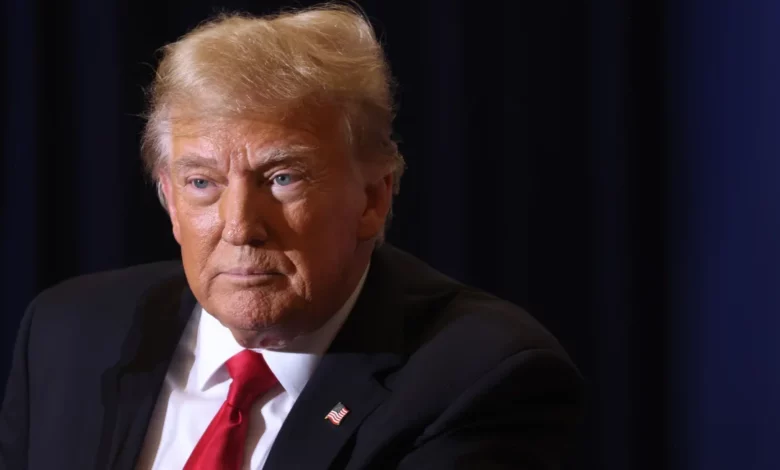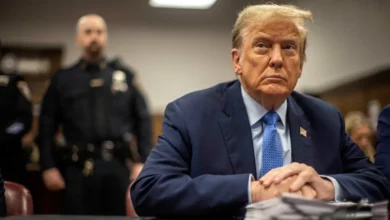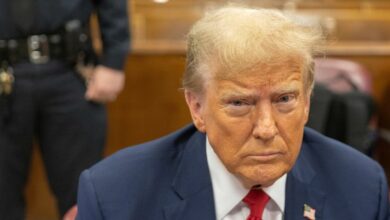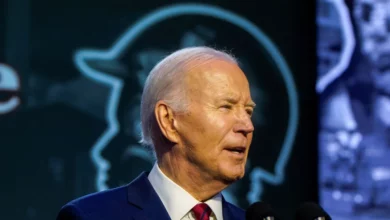
The new presumptive Republican nominee booked his place in a general election rematch with President Joe Biden when his distant, last-remaining rival Nikki Haley conceded to reality and suspended her campaign on Wednesday.
The triumph of the once and possibly future president – an incredible comeback given his attempt to steal the 2020 election and a crush of criminal and civil trials threatening his liberty and fortune – sets up one of the most fateful elections in American history. His demonstrated record of contempt for democratic institutions means that the country’s political, legal and constitutional guardrails are facing a severe new test from a GOP candidate who could be a convicted felon by Election Day and who may see restored executive power as a tool to thwart federal prosecutions.
And Trump’s return to the threshold of the presidency will send shockwaves around a world still recovering from his volatile leadership and affinity for autocrats and send a warning to Ukraine, a nation fighting for its survival.
The reason Trump is so different from a traditional candidate is that he’s not campaigning as a fresh new voice pulsating with optimism for the future or brimming with policy ideas to bring the nation together. He’s portraying America as a dystopian, failed state overwhelmed by lawlessness, urban blight and slipping toward World War III abroad. In a classic trope of dictators, he’s promising to flush out enemies within, vowing revenge on political foes and posing as a strongman while conflating his own personal, political interests with the nation’s.
“We’re a third-world country at our borders, and we’re a third-world country at our elections,” Trump said in a Super Tuesday victory speech at Mar-a-Lago, his Florida resort where he planned his return from political exile. His speech was packed with brazen lies, but it summoned a vision even more bleak than his “American Carnage” inaugural address in 2017. Trump defines this heart of darkness at the end of his campaign speeches with a dirge set against a foreboding soundtrack that thrills his most faithful supporters but turns ideals of American exceptionalism upside down.
For Trump, America is not Ronald Reagan’s “shining city on a Hill.” It is a banana republic. “We are a nation in decline, we are a failing nation,” Trump said in one such screed in Manchester, New Hampshire, in January, portraying the US as beset by rampant inflation, energy shortages, drug infested cities, out-of-control immigrant crime and even dirty, crowded airports. “Who are these people who would do this to us? Who are these people that would ruin our country?” Trump asked.
“We are a nation that has lost its confidence, its willpower and its strength. We are a nation that has lost its way,” Trump went on. “2024 is our final battle. We will demolish the deep state, we will expel the warmongers from our government – we will drive out the globalists, we will cast out the Marxists, the communists and fascists. We will rout the fake news media, we will drain the swamp. … We will be a liberated country again.”
It’s a commentary on the current national mood that this is an enticing message to many Republicans, after a quarter of a century of growing disillusionment with a federal government that presided over draining foreign wars, financial crises, the flight of blue-collar jobs abroad and a pandemic that further shattered trust in institutions and was exploited by the far-right media industrial complex. Trump has deepened the national estrangement by successfully convincing millions of voters of the lie that the 2020 election was stolen and that Biden’s win was illegitimate in a way that is likely to further tarnish US democracy for years to come.
Trump has also leveraged his extraordinary legal quagmire – as he faces nearly half a billion dollars in outstanding civil judgments and four looming criminal trials – to paint himself as a persecuted political dissident. This is yet another example of the ex-president’s quintessential talent of spinning compelling alternative realities that his opponents often find it almost impossible to counter. The collision between Trump’s legal entanglements and a federal election, meanwhile, risks making the constitutional complications of his first term seem like a warm-up act.
The general election race ahead
Trump, 77, will face an 81-year-old incumbent who has, by conventional standards, had a successful tenure – pushing through more major legislation than any first-termer for years. The economy is healthy, unemployment is low, growth is strong and the US is outperforming most industrialized nations. After Trump demoralized US allies in his first term, Biden has reinvigorated and expanded NATO in responding to Russia’s invasion of Ukraine – an illegal land grab Trump suggests he will reward.
But the ex-president’s chances of re-gaining power are considerable since Biden is still deeply unpopular as high grocery prices and rent are robbing Americans of the normality that the president promised to return to them after the pandemic. Trump is seizing on his successor’s failure to fix a border crisis to conjure fears across the country of a migrant invasion that could dilute America’s White social culture in demagoguery that chillingly recalls 1930s fascism.
And Biden’s perceptible aging – including a stiffened gait, reedy voice and the loss of the energetic persona that was his trademark for decades – means many voters are skeptical that he’s fit for a second term that would end when he is 86.
Because of Trump’s extremism and to some extent his own political liabilities, Biden is anchoring his campaign on a warning that his predecessor is not just a threat to democracy but that he’d destroy it. And he’s trying to remind Americans of the chaos and division that characterized Trump’s term, amid apparent nostalgia among some voters for the golden age of stability the ex-president and his aides are selling.
“My message to the country is this: Every generation of Americans will face a moment when it has to defend democracy. Stand up for our personal freedom. Stand up for the right to vote and our civil rights,” Biden said in a statement Tuesday.
“To every Democrat, Republican, and independent who believes in a free and fair America: This is our moment. This is our fight. Together, we will win.”
This approach worked in 2020 when Biden narrowly ejected Trump from the White House. And his democracy message surprised pundits when he led Democrats to a 2022 midterm election performance that defied historic omens of electoral disaster. But he’s now facing a referendum on his own record that many voters disdain. And Trump is on a roll after a dominating performance in Super Tuesday primaries cemented his dominance of the GOP.
An election that could change the nature of life in the United States and transform the country into a force for global instability abroad looks certain to be decided by a few thousand votes in either direction in a handful of swing states.
What Trump says he would do in a second term
Trump’s threat to democratic institutions and the rule of law is not a matter of conjecture. The former president is telling the country exactly what he’d do if he becomes only the second former commander in chief – after Grover Cleveland in 1892 – to win a second, non-consecutive term.
Simply put, Trump is running on the most extreme platform in modern history. He has called for the termination of the Constitution. He wants the Supreme Court to grant unchecked power to the presidency, which he plans to use in a personal quest for “retribution” against his enemies. He is pledging to gut the civil service in government departments and to fill posts with political operatives. He’s signaled he’d use the Justice Department not as a quasi-independent arbiter of the rule of law but as a personal political enforcement machine. Many of Trump’s former officials fear he’d pull out of NATO, trash the post-World War II international system and side with dictators.
He says undocumented immigrants are “poisoning the blood” of the country and vows mass deportations and detention camps. He’s drawn allusions to 1930s dictators by calling his opponents “vermin.” On Tuesday night, an ex-president who has already incited violence to achieve his ends warned supporters that if he didn’t win in November, “We’re not going to have a country.”
It was once fashionable for Trump apologists to chide those who took his threats literally. But after the horror of January 6, 2021, when a pro-Trump mob he told to “fight like hell” beat up police officers, ransacked the US Capitol and tried to block Biden’s legitimate presidency, his rhetoric seems like a chilling harbinger of a second term far more extreme than the first.
But despite his huge wins through key states and dominance of the delegate race – by Wednesday morning he had 1,040 compared to Haley’s 86 – the ex-president’s primary campaign highlighted real liabilities. In state after state, Haley outperformed Trump in suburban areas that are home to moderate and more highly educated Republican voters. This is significant because these are the areas that will decide the 2024 election and Biden must persuade many of the GOP voters who are alienated by Trump and who voted for Haley to pick him.
But the president has his own vulnerabilities. There have been flashing warning signs that he’s struggling to rebuild the diverse coalition that helped him win the White House four years ago. The recent Michigan primary, which saw an organized revolt by Arab American, younger and progressive voters over his handling of Israel’s war in Gaza, highlighted Biden’s exposure to the possibility that key members of his voting bloc could decide to stay home in November. The push by third-party voters, including Democrat-turned independent Robert F. Kennedy Jr., could further squeeze Biden’s margins in key swing states and hand the election to Trump.
Americans must now face the reality of the election that many have long dreaded. A rematch between two flawed candidates that nevertheless could change the character of the nation.




